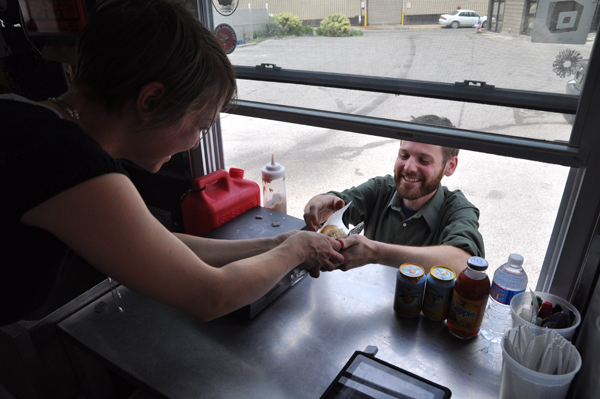PITTSBURGH, PA – Megan Lindsey reaches through the window of her 1988 Chevy P-30 with an all-beef, grass-fed frankfurter in hand. The smell of grilled meat wafts from within as she hands a young man his foil-wrapped lunch. Construction workers join engineers, graphic designers, and hospital staff in this South Side parking-lot for a quick bite to eat from the Franktuary Food Truck.
The latest project of Megan Lindsey and Tim Tobitsch, co-owners of the downtown Franktuary restaurant, they’re hoping this new venture can tap into food truck craze which has taken several other cities by storm.
“It would be so great,” to see more food trucks, Lindsey says. She is hoping the concept of quick, quality food will catch on in Pittsburgh as it has in other parts of the country.
And Dozen Bake Shop just got in on the act. Owner James Gray says his company bought a bare bones truck for street vending, with a goal of selling 300-500 cupcakes each time vehicle hits the pavement. Keep an eye out for the Cupcake Mobile and follow it on Facebook.
Truckin’
One explanation for the popularity of food trucks is that they cost less to operate than traditional restaurants, and consequently, vendors are able to keep their prices relatively low.
But prices can be misleading, because the high quality fare offered through trucks has established four-wheeled vendors as legitimate destinations for inventive, gourmet cuisine. In Los Angeles you’ll find Korean BBQ tacos; Austin, Texas boasts syrup-smothered chicken and waffles; in Orlando, Florida a Puerto Rican truck serves the mashed plantain dish mofongo.
Perhaps the most notable mobile food truck in Pittsburgh in recent years has been the Goodie Truck. A retrofitted mini-bus painted bright red, the Goodie Truck serves homemade sweets to late night party crowds and daytime gatherings.
They’re currently offering Fancy-Pants Snow Cones, home-made ice cream sandwiches, and cookies. To find the Goodie Truck, their location is posted on both their Facebook and Twitter pages.
But overall, Pittsburgh hasn’t seen the same mobile-food boom as elsewhere. The city’s vending rules stipulate that trucks and carts cannot operate within 500 feet of a similar brick-and-mortar store, and require trucks to move every 15 minutes, a major obstacle for this type of business.
“To drive with boiling oil sloshing over is pretty inconvenient,” Lindsey says.
Robert Frommer is an attorney with the Institute for Justice, a public interest law firm based in Arlington, Virginia. His firm has launched an initiative to protect the “economic liberty of street vendors,” by challenging the constitutionality of anti-competitive ordinances.
“The benefits of vendors are huge,” Frommer says, as a source of fresh food, and as the eyes and ears of the street. “They bring people onto the street, and a well used street is a safe street.”
The Institute for Justice will be publishing an original report about street vending in the U.S., a small part of which discusses Pittsburgh.
But in the meantime, Franktuary has found a model that they hope will work for them. The Hotel Metal Bridge Faith Community, where Lindsey attends church, has allowed the truck to park in their lot during the week. The groups went through an expensive zoning variance and permitting process, and they’re now allowed to operate here without having to pick-up and move.
In addition to locally made, organic franks, the Franktuary truck is offering internationally themed toppings for their dogs. The Brasil includes mashed potatoes, tomato corn relish, bacon, and potato sticks; on the Oahu, pineapple, teriyaki sauce, bacon, and green onions.
Other items on the truck include a carrot dog, marinated in hot-dog spices, and a take on the Canadian dish poutine, using locally made cheese curds from Arsenal Cheese, and a house-made vegetarian brown gravy.
Find the entire article <here>




